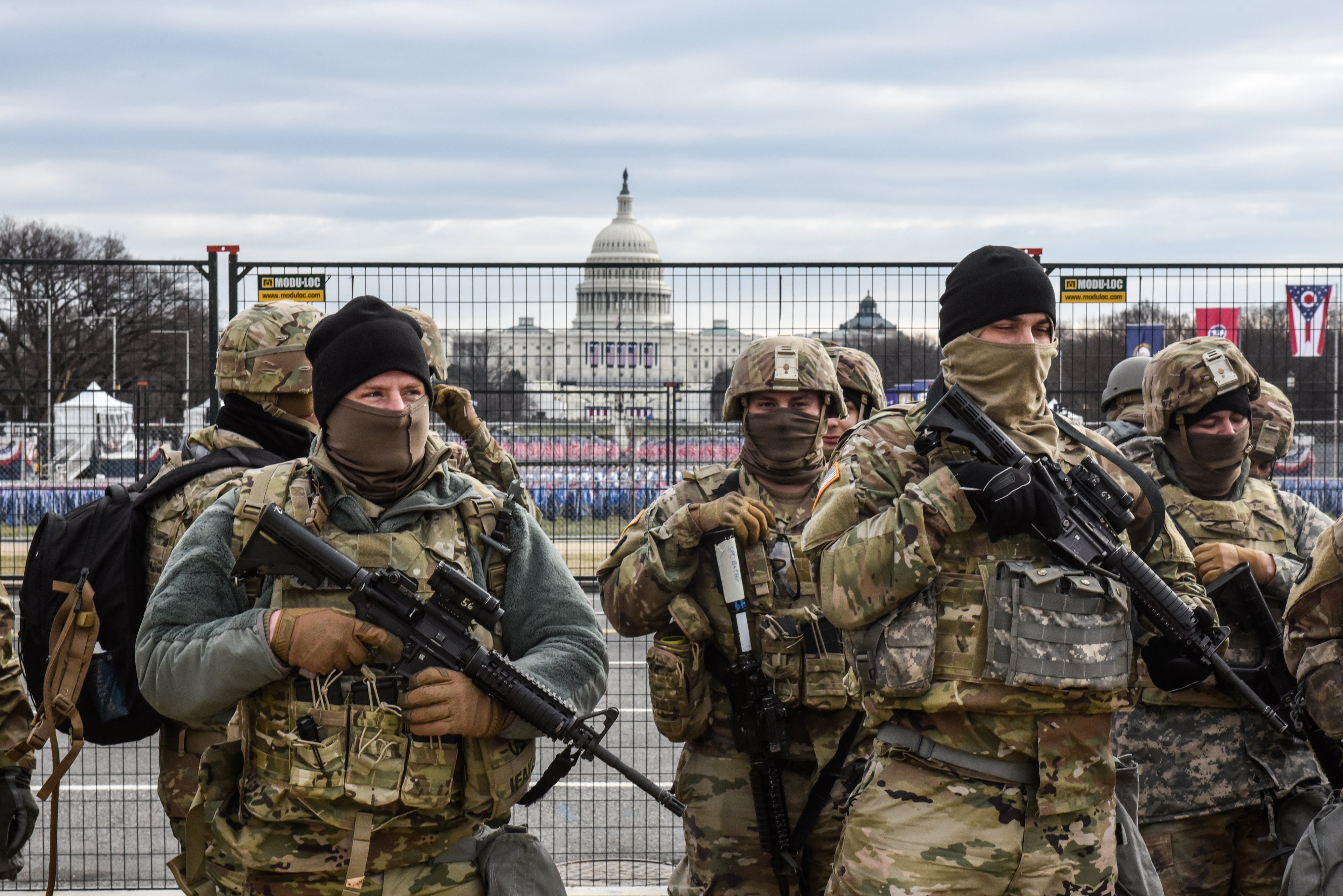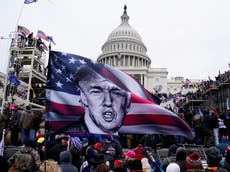‘The world is watching’: Biden’s militarised inauguration the ultimate test of America’s claim as ‘leader of the free world’
Democrats working to show the last four years were ‘an aberration’ in US foreign policy, writes Griffin Connolly


Your support helps us to tell the story
From reproductive rights to climate change to Big Tech, The Independent is on the ground when the story is developing. Whether it's investigating the financials of Elon Musk's pro-Trump PAC or producing our latest documentary, 'The A Word', which shines a light on the American women fighting for reproductive rights, we know how important it is to parse out the facts from the messaging.
At such a critical moment in US history, we need reporters on the ground. Your donation allows us to keep sending journalists to speak to both sides of the story.
The Independent is trusted by Americans across the entire political spectrum. And unlike many other quality news outlets, we choose not to lock Americans out of our reporting and analysis with paywalls. We believe quality journalism should be available to everyone, paid for by those who can afford it.
Your support makes all the difference.“The world is watching.”
That’s the common refrain among the American foreign policy establishment each time the nation faces a moment of internal democratic crisis, as it did during the insurrection at the federal Capitol building on 6 January.
When Joe Biden takes the oath of office on Wednesday, he will be ousting a one-term president, Donald Trump, who leaves the White House under the cloud of impeachment for fueling an attempt to block the most foundational and sacrosanct American tradition: a peaceful transfer of presidential power.
Read more: Follow live updates and news on Inauguration Day 2021
So once again, the guardians of American diplomacy have issued their grave reminder: The world is watching. Dictators are taking note. What does the United States stand for?
Here’s what that watchful world will see on Inauguration Day: A fortress Washington, a city whose 700,000 denizens have made “Be safe!” a standard two-word exhortation as part of their goodbye cordialities checking out from the grocery store, hopping out of ride shares, parting from friends at the dog park.
As many as 25,000 members of the National Guard — armed with black assault rifles and wearing full camouflage — will be standing watch over the nation’s capital during the inauguration.
“As we speak, there are more troops around the Capitol than there are in Afghanistan,” Senate Democratic Leader Chuck Schumer said on Tuesday in a speech on the chamber floor.
“No force — no force — will prevent tomorrow’s Constitutional proceedings from taking place,” he said, noting that the transition period between the 2020 election and Mr Biden’s inauguration has been “anything but peaceful.”
As early as last week a secure zone was established in downtown Washington, with more than a dozen metro stations closed to deter people from travelling into the city.
The Guard has erected fences topped with barbed wire to surround the entire Capitol complex, where the inauguration ceremony commences at 11am on Wednesday. Among the sacred buildings fenced off are the Capitol itself, the Library of Congress, and the Supreme Court, as well as the six House and Senate office buildings on the outskirts.
Barricades for vehicles extend even farther out: a three-block perimeter in every direction from the nearest vital federal building on Capitol Hill.
Makeshift barracks
The Capitol itself has become a makeshift barracks for the thousands of troops stationed in Washington, with rows upon rows of cots lining the walls of hallways that in ordinary times are the frenzied highways of legislative business.
The cots have been provided by FEMA, the Federal Emergency Management Agency. That’s the government agency that typically flushes money and resources into areas of the country hit by tornadoes, hurricanes, and other natural disasters.
Federal legislators — some of whom snapped surreal images over the weekend of off-duty troops kicking back on their cots, scrolling through their phones, and snacking on pudding packs — certainly did not envision such government aid to be used in the nation’s capital to ward off threats from domestic right-wing terrorists aiming to thwart American democracy.
Democratic foreign policy leaders recognise that even if the inauguration, as expected, goes off without a hitch, Mr Trump’s fundamentally anti-democratic behaviour over the last two and a half months has all but destroyed the country’s claim as “leader of the free world.”
The president’s stonewalling of the Biden transition team, his constant lies about a stolen election during the transition, and his incitement of the mob that stormed the Capitol on 6 January has been a “substantial blow to US credibility abroad when it comes to promoting democracy and democratic values,” House Foreign Affairs Chairman Gregory Meeks told The Independent in a statement on Tuesday.
The deadly pro-Trump insurrection at the Capitol, where five people were killed, including a US Capitol Police officer, has already provided years-worth of ammunition for the propaganda machines of authoritarians and despots around the world who will “want to frame American democracy as frail, and [claim] that they can fill the void left by Trump’s isolationism,” Mr Meeks said.
Democrats’ No 1 job over the next four years will be working with Mr Biden and his administration to prove that the last four were “an aberration and not the new norm for the US role on the world stage,” the chairman said.
The bipartisan establishment
Even though Republicans and Democrats remain as divided on fundamental issues of governance as at any time in modern US history, the bipartisan foreign policy consensus that has dominated the Post World War II era largely persists.
While the parties’ respective left and right fringes have supported many of Mr Trump’s drawdowns of troop levels in conflict zones such as Afghanistan, Syria, and Iraq, establishment figures among Democrats and the GOP have advocated for the continued presence of peace-keeping forces throughout a still-fragile — or, in many cases, still-warring — Middle East.
Just in the last two weeks, Secretary of State Mike Pompeo has designated Cuba as a state sponsor of terrorism and slapped a terrorist cell label on the Iran-backed Houthi rebels in Yemen.
Senate Foreign Relations Chairman Jim Risch and House Foreign Affairs ranking member Michael McCaul echoed their Democratic counterparts in a statement last week warning of an exacerbated food shortage crisis in Yemen if the Trump administration were to mete out a raft of designation-trailing sanctions on the areas of the country controlled by the Houthis.
“Yemen imports 90% of its food. In light of near-famine conditions that have already existed in Yemen, this designation will have a devastating effect on Yemen's food supply and other critical imports unless the executive branch acts now to issue the necessary licenses, waivers and appropriate guidance prior to designation,” the Republican lawmakers said, tacking closely to the Democratic response.
The respective Democratic and GOP foreign policy establishments do not see eye to eye on every issue, of course.
But they do appear to understand in equal measure how the external optics of the transition shape the country’s reputation around the world.
“Between the extensive security measures and the COVID-related restrictions, this inauguration will look very different than in years past,” Mr McCaul acknowledged in a statement to The Independent on Tuesday.
The congressman suggested it is not the “pomp and circumstance” of the inauguration that should be the main focus of the day, but rather the US government’s resilience in the face of domestic bloodshed and disaster just two weeks prior.
“The U.S. Presidential Inauguration is a time when we remind the world what a democracy looks like, how the presidential office doesn’t rest with one individual, rather with the very ideals of our free nation,” he said.
“This sends the message to everyone that, no matter what, America values democracy and that free and fair elections work.”





Join our commenting forum
Join thought-provoking conversations, follow other Independent readers and see their replies
Comments